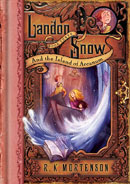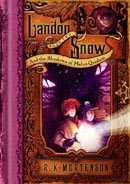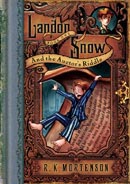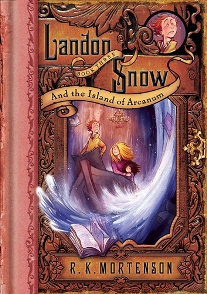11/17/2006
Where do you draw the line? Speculative fiction vs Biblical speculative fiction.
Speculative fiction, by definition, isn't based in "reality." Biblical Spec-Fic is simply an effort to ground these tales of fantasy, alternate realities, etc. in a Biblical light. And while every author's "purpose" is slightly different (some like to evangelize, some simply want to entertain while keeping things "acceptable" to the Christian audience, some want to reaffirm or lift up those already rooted in their faith, etc), I can't help but wondering exactly where one draws the line. Not that I'm one to teeter on the edge and keep glancing over the line into dangerous waters, but I could certainly be accused of my share of risky ventures.
I write supernatural thrillers (what most in the general market would call horror). So, my line is going to be a little bit different than your line. I'm curious to know, where do you draw the line between what you would call Biblical and what you would say is not...
There are a lot of "Christian" authors out there in the general market that aren't writing Christian novels. That doesn't mean that they aren't Christian-friendly, but they aren't writing stories for the CBA market. Now, while I think that's great and am glad they're getting paid to write, doing what they love, etc, the only thing that separates many of those stories from the rest of the fiction on the shelves is a simple lack of profanity, gratuitous violence, sex, drug use, etc. etc. So, would you clump any of their writings in with "Biblical" spec fic? Or does that cross your line?
For me, writing "horror," there are a lot of lines that could be crossed. How many cults have some kind of sexual ritual? How many "demons" that Hollywood unleashes are out just dying to curse, drink, and fornicate away their freedom before some holy-roller sends them back to hell? How many cheesy horror flicks have cliched teenagers running around naked so everyone watching knows who is going to die first? And then, how far do you go in showing the "dark" side of things? How much of some pagan ritual is too much to show before it could be a lure to draw kids into witchcraft? How many supernatural powers can you give the "bad" guys before you are making them "cool"? Etc. Etc.
When the day is done, when I put the laptop away and head off to bed, what makes my day's work any different from those folks out there in the general market? Why am I submitting my scary stories (that I just KNOW rival the scares of Mr. King or Mr. Koontz or Mr. Craven...) to an ABA agent instead of gunning for the big paychecks?
The answer is quite simple. About 2000 years ago, Christ dragged a line in the sand on His way to Calvary. If you want to see it, stop by the websites of anyone on this blog rotation and look deep.
So, where do you draw your line?
11/15/2006
Day 3: BLOG Tour featuring R.K. Mortenson
 Should one judge a book by its cover? perish the thought!
Should one judge a book by its cover? perish the thought!And, apparently, few book buyers are swayed by cover art:
On average, a bookstore browser spends 8 seconds looking at the front cover, and another 15
 seconds scanning the back cover. This isn’t much time to make a sale, so you should pay close attention to making your text stand out and be read quickly and easily (apparently, universal advice given to authors)
seconds scanning the back cover. This isn’t much time to make a sale, so you should pay close attention to making your text stand out and be read quickly and easily (apparently, universal advice given to authors)I would argue that in the case of the Landon Snow series by R.K. Mortenson, the cover art alone will lure a child (or in
 this case, an adult) into opening the door onto what must surely be a fabulously rich world of fantasy. The bas-relief of the borders, the draping folds and calligraphy are reminiscent of the Illuminations of miniaturists in 15th century France. The naively rendered figures seem to be lured through the borders into the fantasy world of Landon Snow. How 'enchanting' for young readers!
this case, an adult) into opening the door onto what must surely be a fabulously rich world of fantasy. The bas-relief of the borders, the draping folds and calligraphy are reminiscent of the Illuminations of miniaturists in 15th century France. The naively rendered figures seem to be lured through the borders into the fantasy world of Landon Snow. How 'enchanting' for young readers!From all accounts, the stories beyond these lovely covers, do not leave children disappointed. The adventures of Landon Snow immerse the reader in a make-believe world of fantasy where the characters rely on hope and faith instead of the gray world of magic to bring their tales to a satisfying conclusion.
Visit amazon.com to take a peek inside the covers
11/14/2006
November's CSFF BLOG TOUR Day 2
3rd in the Landon Snow series
by author R.K. Mortenson

Publicized as a non-sorcerous alternative to the Harry Potter series, the Landon Snow novels use Biblical passages as the vehicle through which the Auctor — God — provides Landon with hints about his next adventure, and it is hope and faith, rather than magic, that the characters rely on for their success. While the Landon Snow novels don't offer the complexity and depth of Potter's world of wizards and Muggles, they are prosocial fantasy adventures that emphasize faith and family and avoid the moral shades of gray that have disturbed some Christians about the Potter novels.
About the Author:
R.K. (RANDALL KENT) MORTENSON, an ordained minister in the Church of the Lutheran Brethren, has been writing devotional and inspirational articles since 1995. R.K. is the author of the Landon Snow series. The adventures of Landon Snow are meaningful as they are entertaining and magical. Mortenson currently serves as a Navy chaplain in Florida. He lives with his wife and daughter in Jacksonville.
Or, as Mr. Mortenson introduces himself on the Landon Snow website:
I'm R. K. Mortenson (the R and K may stand for "Really Kind," "Radically Kool," or "Remarkably Knowledgeable." They also happen to be my initials-Randall Kent. Though I go by Randy.)
On his site Mortenson addresses an issue often debated and discussed by Christian writers: Can Christian authors write fantasy fiction that is Scripturally sound?
As I was writing Landon Snow I kept wondering, "Is it okay to do this? Can I use the Bible in the story and include fantasy?" My fears, I realized, were over what other people would think. When I looked to God and asked the same questions, the questions fairly evaporated. I felt reassured by a sense of God telling me: I gave you my Word; I gave you a vivid imagination; I gave you the talent to write. Use them.
Read some additional comments R.K. Mortenson makes on the website about writing--I think you'll find them interesting.
The Landon Snow series is available at:
www.amazon.com
What do other CSFF Bloggers have to say?
Jim Black
Jackie Castle
Valerie Comer
Frank Creed
Gene Curtis
Chris Deanne
Janey DeMeo
April Erwin
Beth Goddard
Todd Michael Greene
Leathel Grody
Karen Hancock
Katie Hart
Sherrie Hibbs
Sharon Hinck
Joleen Howell
Jason Joyner
Karen and at Karen’s myspace
Oliver King
Tina Kulesa
Lost Genre Guild
Kevin Lucia
Rachel Marks
Shannon McNear
Rebecca LuElla Miller
Caleb Newell
John Otte
Cheryl Russel
Hannah Sandvig
Mirtika Schultz
Stuart Stockton
Steve Trower
Speculative Faith
Chris Walley
Daniel I. Weaver
What is Reasonable Service for a Writer?
“I beseech you therefore, brethren, by the mercies of God, that ye present your bodies a living sacrifice, holy, acceptable unto God, [which is] your reasonable service.”
God calls the members of his family to different tasks. In my daily reading yesterday, I came across Romans 12:1. This is a special verse to me, because it’s the one God chose to draw my mother into the family of God over twenty years ago. As I read it yesterday, I stopped to ponder how it applies to us as writers.
We understand what it means to present our bodies as a living sacrifice but what is reasonable service? And how does it pertain to writing? It’s easy to think of our own definition of reasonable and roll with it, but whenever I start wandering along the what’s that mean trail, I turn to the original language instead of depending on my own understanding or current meaning of a word. The word reasonable comes from the Greek logikos {log-ik-os'}:
1) pertaining to speech or speaking
2) pertaining to the reason or logic
a) spiritual, pertaining to the soul
b) agreeable to reason, following reason, reasonable, logical
When I looked at it in this light, it’s easy to see that writing falls within the parameters of “reasonable.” Writing takes our speech and logic and opens a window to our soul for others to see. It follows reason and logic and takes others along on a journey.
And what about “service”? The Greek latreia {lat-ri'-ah} means:
1) service rendered for hire
a) any service or ministration: the service of God
2) the service and worship of God according to the requirements of the Levitical law
3) to perform sacred services
Well, that covers just about anything we do, since “Whether therefore ye eat, or drink, or whatsoever ye do, do all to the glory of God” (1 Cor. 10:31), because whatever we do is service to Him.
Writer’s who write speculative Christian fiction sometimes receive negative feedback from the community of believers, but if God has called you to write, even the lost genre of Christian spec-fic—consider it part of your reasonable service.
11/13/2006
Day One: Landon Snow and the Island of Arcanum

In the third of the Landon Snow series, Island of Arcanum Landon is fully involved in a football game when he begins to see animals all around him. And, not just dog and cats -- wild animals. Could the ref actually be a zebra? Coach Huddle a big hairy gorilla? wow, the opposing team appears to be made up of bears and wolves! Maybe Landon needs a holiday . . .
Well, Landon eagerly anticipates the holiday with his family in Button Up, Minnesota. The suspense builds as Landon begins to plan:
"Which meant, of course, that Landon was hoping to
sneak into the Button Up Library—the BUL—in the middle of
the night, perhaps with Holly tagging along. This time, however,
he would make her promise—cross her heart and hope to die—
that she would not follow any slinking shadows into dark corners
or down creepy stairways."
Landon Snow finds himself on a wild adventure at sea. When a huge, ark-like vessel emerges, Landon-and his sisters-join a quest to find the Island of Arcanum, where the animals of Wonderwood are imprisoned. With the help of his old friends-a horse named Melech, elfish valley folk, a girl named Ditty, and the poet/prophet Vates-Landon seeks to unlock the island's dark secrets and escape with the animals. But he must battle storms and the villainous Arcans-pirates who hoard animals as treasure. Will Landon ever make it back to Wonderwood alive?
I’m sure I’ll have temporary insomnia until I finish all three books if I actually have the books in my hands--sleepless nights for a good cause.
Publisher:Barbour Books
ISBN:1597893587
Page Count:224 pages
Price:$9.97
Recommended for readers 9-12 years
Amazon
The Landon Snow website
Visit now.
Read what others say:
April Erwin
Beth Goddard
Caleb Newell
Cheryl Russel
Chris Deanne
Chris Walley
Daniel I. Weaver
Frank Creed
Gene Curtis
Hannah Sandvig
Jackie Castle
Janey DeMeo
Jason Joyner
Jim Black
John Otte
Joleen Howell
Karen and at Karen’s myspace
Karen Hancock
Katie Hart
Kevin Lucia
Leathel Grody
Mirtika Schultz
Oliver King
Rachel Marks
Rebecca LuElla Miller
Shannon McNear
Sharon Hinck
Sherrie Hibbs
Speculative Faith
Steve Trower
Stuart Stockton
Tina Kulesa
Todd Michael Greene
Valerie Comer
Response-ibility
…to fellow believers in Christ
…to the lost
We mostly do well with the first and last. But, as observed, the second is neglected; our love for each other has grown cold, or worse, apathy has become the rule of the day.
1 Corinthians 12:12 says For as the body is one, and hath many members, and all the members of that one body, being many, are one body: so also is Christ.
So what am I in the body of Christ? If I’m just a nose hair, I will not let go. I’m one with fellow nose hairs that filters air inhaled by the nose.
1 Corinthians 12:26 says If one part suffers, every part suffers with it; if one part is honored, every part rejoices with it.
If I don’t feel the pain of a fellow believer, I need a self-check. I might be surprised to find that I’m only the greatest wart in the body of Christ—not benefiting the body but causing ache and humiliation.
Am I connected to the body but disconnected from the head (or brain if you may)? Am I a little finger that loses all kinds of feeling, thus I can’t support the coffee mug when the body wants to drink?
We all know this. But do we understand its essence? Each one must be an encouragement to another.
I need to stop pointing my finger to a fellow Christ-believer and blame him for not showing Christlikeness to me. Change must start with me.
Of course, there are times when we don’t agree. This is necessary for our growth. But do I hide self-agenda and call it “rebuke”?
Let each of our actions be an act of love.
What has this got to do with our purpose here in LGG? Everything! A body fulfills its role better if every part, even the ones we consider ugliest, does its part.
How do I answer for my fellow believer in Christ?
